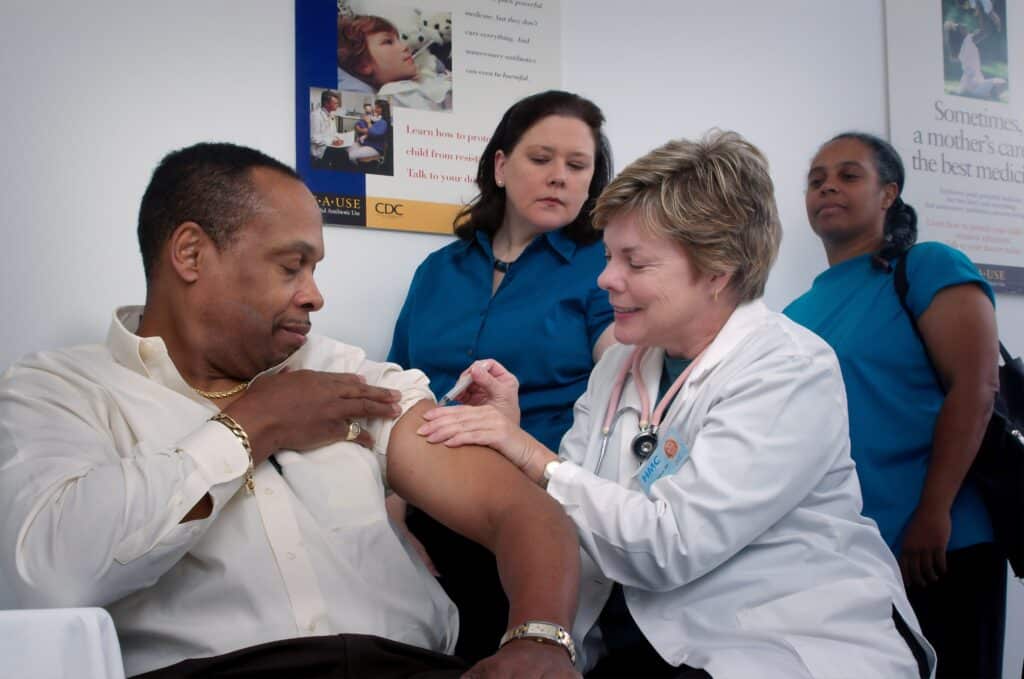
Anyone relocating to live in Spain long-term will have plenty to learn about – from how to rent property in the country to how the local tax system works. Understanding how Spain’s healthcare system works is also important. After all, you’ll want to be able to get the care you need while living abroad.
To make the Spanish healthcare system easier to understand, our team here at Remitly created this quick guide covering the key points, from who’s able to access free healthcare to what exactly the public system covers.
How the healthcare system works in Spain
Spain’s national healthcare system, the Sistema Nacional de Salud, provides comprehensive healthcare services. The social security program in the country pays for the public health system.
Basically, people pay into the social security system through deductions taken from their paychecks. How much you have to pay in social security will depend on the nature of your work, your salary, and whether you’re employed or self-employed.
Employees usually pay significantly less than the self-employed because their employers partly cover their social security obligations. Self-employed residents have to pay the whole amount themselves. Whatever the amount you’re liable to pay, making the required social security contributions entitles eligible Spaniards to access their family doctor, specialists, and public hospitals without paying extra.
Spain has two healthcare systems. In addition to the public system, there is a separate private healthcare option. Private hospitals don’t accept the national healthcare plan but usually work with private medical insurance plans.
Nearly one-quarter of Spanish people have additional private health insurance beyond the universal healthcare Spain provides. People who opt for private health insurance may do so to gain access to services not covered by public Spanish health insurance or to cut down on wait times when they want to see their family doctor or need emergency services.
Who can access public health insurance in Spain?
In Spain, anyone who pays social security can receive public health insurance. As a result, self-employed immigrants or employees who earn wages can generally access Spanish public healthcare.
People who receive state provisions like unemployment benefits may also be able to access the public healthcare system in Spain.
What does the Spanish public healthcare system cover?
Public insurance covers a range of services, including:
- Primary care services
- Family and pediatric services
- Specialist consultations
- Hospital care
- Emergency care (including emergency dental treatments)
- Physical therapy
- Mental health services
When it comes to prescription medications, Spain operates a co-payment scheme. This means you’ll have to pay up to 60% of the price of medications, depending on your household income.
How to register for public healthcare in Spain
It probably won’t come as a surprise to learn that registering for Spain’s public healthcare system requires some paperwork.
An important first step for any new immigrant to the country looking to get health insurance in Spain is to get listed on the padrón, the municipal register that officially confirms your address. This can be done at your local town hall, and you’ll typically have to show your passport, rental contract, recent utility bill, and NIE (foreigners’ identity number).
You’ll also need to apply for your social security (seguridad social) number and a certificate stating you have a right to access public healthcare. Your employer (if you have one) may handle the formalities.
Otherwise, you’ll have to visit a local office of the Tesoreria de la Seguridad Social. Using this official online directory, you can look up the contact information for the most conveniently located office.
You’ll be required to submit a completed TA.1 form and show your passport, visa and residency documentation, NIE, and padrón certification. You may also have to show your employment contract and/or rental agreement, so it’s a good idea to bring these along, just in case.
Once you have your social security number and official confirmation of your eligibility for healthcare, you’ll be all set to obtain your unique Spanish healthcare card. Also known as the Tarjeta Sanitaria, the card will need to be shown to health centers and hospitals whenever you require medical services and treatments in the country.
The card can be obtained at your local health center or Centro de Salud. Your autonomous region’s official government website will let you look up which health center corresponds to your address. For example, a resident of Catalonia can pinpoint the right health center here.

Do you need private healthcare in Spain?
The National Health System in Spain ticks plenty of boxes, providing world-class care across its network of doctors, surgeries, and hospitals.
That said, a significant proportion of people do opt for private healthcare insurance. Private insurance can let you access specialists more quickly and receive treatment at private clinics and hospitals. You can also expect shorter queues for surgery and other treatments.
Some people may also prefer private insurance because the hospital or health center closest to them is private. Expats may find that there are more English-speaking healthcare providers at a particular private hospital than there are at the closest public one.
Keep in mind that it’s possible to use both the private and public systems in Spain. People may take out policies with private health insurance companies to cover some healthcare costs while obtaining basic care through public clinics and hospitals.
Choosing private health insurance in Spain
To choose the right private insurance for your needs, consider cost, policy type, and other factors. In this section, we’ll examine what may influence your decision when choosing private health insurance in Spain.
Cost of private health insurance in Spain
Prices for private health insurance policies can vary widely depending on your age, personal circumstances, and how wide-ranging the coverage is. The monthly fee or premium can range from around €35 all the way to €300 and beyond.
To get the best rate, use a price comparison portal, such as Acierto or Rastreator, to compare different packages and private insurance companies.
Reimbursement vs. co-payment private health insurance
If you decide to purchase private health insurance in Spain, you’ll need to choose between reimbursement and co-payment health plans. Let’s take a look at each type.
Reimbursement health insurance
With a reimbursement policy, you’ll typically get full access to treatments provided by health clinics and hospitals within the insurer’s own network, and you’ll also be able to pay for treatment by healthcare providers outside the network and have a percentage of these costs reimbursed.
For example, a policy may fully reimburse you 90% of medical fees when you go outside the insurer’s network, up to a maximum of €500,000 per year. This flexibility is a key advantage of reimbursement policies, and if your work requires traveling across the country or even abroad, this kind of insurance may be for you.
Co-payment health insurance
Co-payment policies require you to pay certain fees on top of your monthly premium for every service or treatment you use. For example, you may have to pay €24 for an emergency home visit by a doctor or €8 for a physiotherapy session.
You will likely be restricted to the insurer’s network of medical providers and hospitals. Still, the main advantage here is that premiums tend to be lower than some more flexible and all-encompassing reimbursement policies.

Other factors to consider when choosing private health insurance
Some other things to think about when comparing health insurance policies include:
- Pre-existing conditions: Will the plan cover any conditions that you already have?
- Coverage: Different private insurance plans cover different things. Are the services that you need covered by the policies you’re considering?
- Caps: What is the maximum amount of medical insurance coverage, and are you likely to exceed that?
- Network: Are the hospitals and clinics in the network convenient for you?
- Customer service: What is the health insurance company’s reputation like?
Frequently asked questions about Spain’s healthcare system
If you still have questions about healthcare in Spain, read on for answers.
Can you use a European health insurance card in Spain?
EU citizens and legal residents of EU nations with valid health insurance cards can typically qualify for free or low-cost healthcare services at public hospitals in Spain. Private hospitals are unlikely to accept the cards.
Will travel insurance cover medical costs in Spain?
Whether or not travel insurance will cover the cost of healthcare in Spain depends on the type of policy that you choose. Some plans do include medical coverage, while others don’t. As a result, it’s a good idea to carefully read the details of a policy before you purchase one.
Can I use international health insurance in Spain?
International health insurance is a type of private health insurance sold in the U.S. and some other countries that provides medical coverage while traveling abroad.
International health insurance companies establish their own rules for policies. Whether you’ll be able to use international health plans in Spain depends on several factors. Your policy will need to include coverage for Spain, the health center or hospital will need to accept that type of insurance, and the medical procedures or services being performed will need to be covered by the policy.
Also, international health plans may not be available to people living in Spain for extended periods. Health insurance companies may only cover the cost of medical services performed during short stays like business trips or vacations. However, some policies are expat health insurance specifically intended for people living abroad for long periods.
Check with your insurance company for more specific information.
Can you get free dental care in Spain?
Children aged 15 and younger do receive free dental care in Spain. Adults can also access free dental services on an emergency basis with a Spanish healthcare card. However, routine dental care is not part of Spain’s free public healthcare system.
Some private health insurance plans in Spain do offer dental coverage. If an insurance plan covers dental services, the insured may need to make co-payments to cover some of the cost of services.
Weigh your healthcare options
Your personal situation depends on whether you should purchase private health insurance in Spain. Consider the basic healthcare available through the public system and your additional needs. Also, think about your budget and whether you can afford the premiums for private health coverage.
Use the information outlined above as a starting point as you compare private and public healthcare coverage in Spain. If you have additional questions about state healthcare, contact your local Spanish social security office or health center.
Remitly makes international money transfers faster, easier, more transparent, and more affordable. Since 2011, over 5 million people have used our secure mobile app to send money with peace of mind.
Visit the homepage, download our app, or check out our Help Center to get started.
